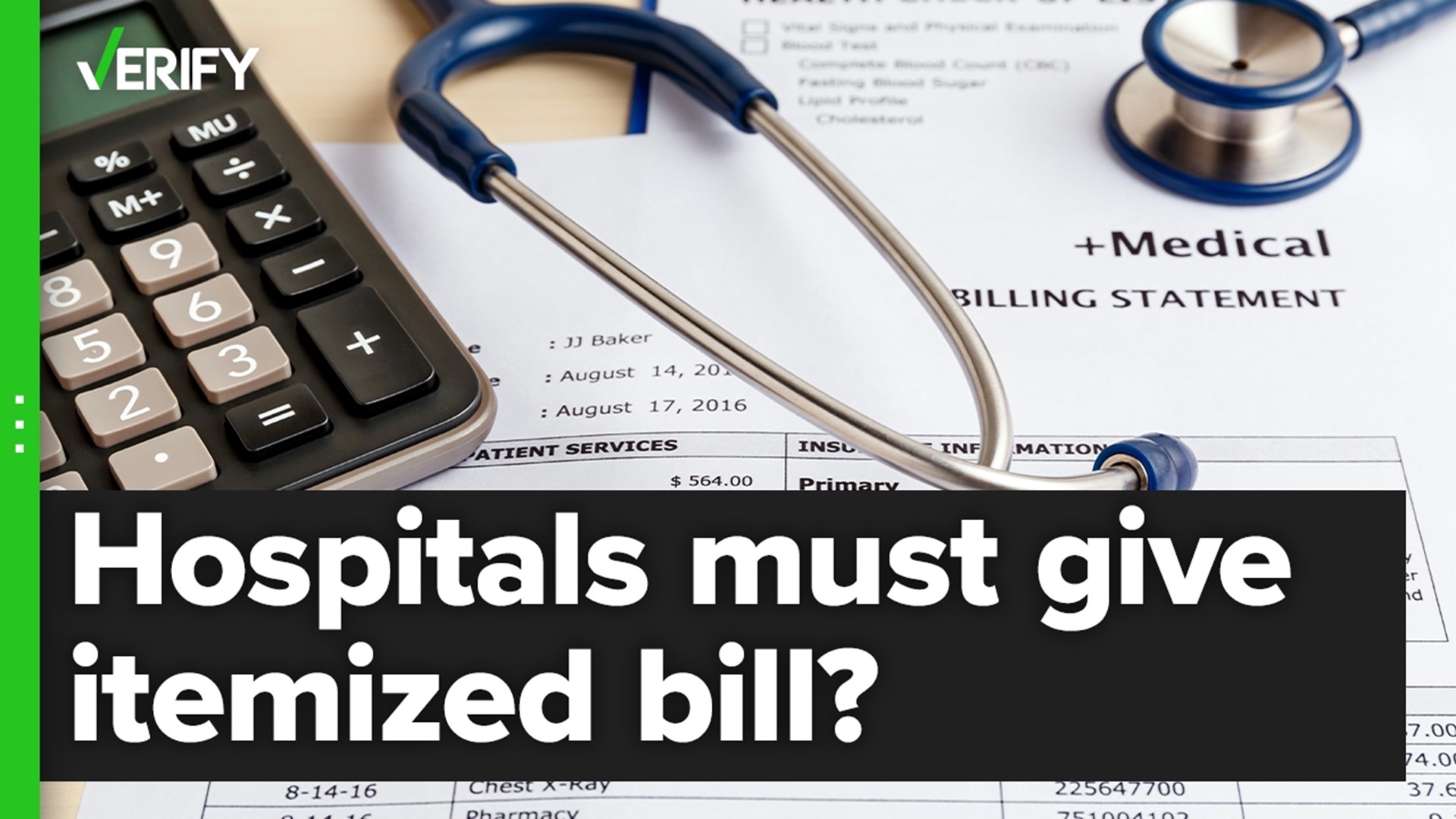Millions of people are saddled with health care debt in the United States. A recent Kaiser Family Foundation report found that 4 in 10 American adults have some form of debt due to medical and dental bills.
A TikTok video from March, which recently went viral on Instagram, claims hospitals are legally required to provide an itemized bill — a line-by-line breakdown of all charges billed after medical services are provided — if a patient requests one. These detailed bills allow patients to check for and contest duplicate or erroneous charges.
THE QUESTION
Are hospitals legally required to provide an itemized bill upon request?
THE SOURCES
- Centers for Medicare and Medicaid Services (CMS)
- No Surprises Act
- Maryland Attorney General’s Office
- Adria Goldman Gross, CEO and founder of MedWise Insurance Advocacy and MedWise Billing, Inc.
- AnnMarie Quintaglie McIlwain, board-certified patient advocate and CEO of Patient Advocators
THE ANSWER
Some states have laws that legally require hospitals to provide itemized bills upon request, but not all. Some hospitals also have individual policies that require itemized billing upon request, even if the state doesn’t require it by law. Medicare patients, regardless of state or location, have the right to receive a free itemized hospital bill, if requested.
WHAT WE FOUND
Adria Goldman Gross and AnnMarie Quintaglie McIlwain, who both run patient advocacy organizations, told VERIFY that certain states, including Maryland, Virginia, New York, Massachusetts, Florida, Texas, and Illinois, do have laws on the books that give patients the right to receive a copy of an itemized bill from a hospital upon request. Hospital systems in other states also have their own individual requirements regarding whether patients can request a copy of an itemized bill.
But VERIFY found that this is not a legal requirement at hospitals in every state, like the viral video implies — and some hospitals without documented policies could refuse to provide an itemized bill upon request since it is not mandated in that state.
“If you Google Patient Bill of Rights for your state — I did this for New York and Florida — I was able to get the current Patient Bill of Rights in those two states, and included on that list was that you are entitled to an itemized list of services and the costs related to them,” McIllwain said.
A Patient Bill of Rights is a document that typically provides patients with information on how they can reasonably expect to be treated during their hospital stay.
More from VERIFY: Yes, most hospitals are required to offer financial assistance
Medicare patients, regardless of state or location, also have the right to receive a free itemized statement from a hospital upon request, a Centers for Medicare & Medicaid Services (CMS) spokesperson told VERIFY.
“If the Medicare consumer sends a written request for an itemized statement, their provider or supplier has 30 days to provide it. If the provider or supplier does not, they can be fined up to $100 per request,” the CMS spokesperson said.
Although providing itemized hospital bills to patients upon request is not a requirement at all hospitals nationwide, under the federal No Surprises Act, which went into effect in January, hospitals across the country are required to provide a good faith estimate (GFE) to patients without insurance or individuals paying out of pocket when scheduling a medical procedure, or upon patient request.
The Maryland Attorney General’s Office explains on its website that a good faith estimate includes a list of items and services that the hospital reasonably expects to provide you for that period of care and the out-of-pocket cost of those items. People without insurance and individuals who pay out of pocket can dispute a medical bill if the final charges are at least $400 higher than the good faith estimate they received from the hospital, according to CMS. Dispute claims must be filed within 120 days of the date on the bill.
More from VERIFY: Inflation Reduction Act only caps insulin prices for Medicare patients, not for people with private insurance
The No Surprises Act also requires hospitals to provide an advanced explanation of benefits to people with private insurance in certain circumstances, such as when a patient schedules a health care service at least three business days in advance of the service, and upon request if the service has not yet been scheduled. An advanced explanation of benefits is an overview of the total charges for your visit, and how much you and your health plan will have to pay.
For tips on how to negotiate a lower medical bill, you can contact a patient advocate, like Gross or McIlwain, or a medical billing advocate, who can work with your health care provider and insurance company to resolve billing issues. To check if your hospital or medical provider will send an itemized bill, visit its website or call its billing department.
VERIFY reached out to the creator of the TikTok video for comment but did not hear back by the time of publication.
More from VERIFY: No, Congress is not considering $300 billion Medicare cut

